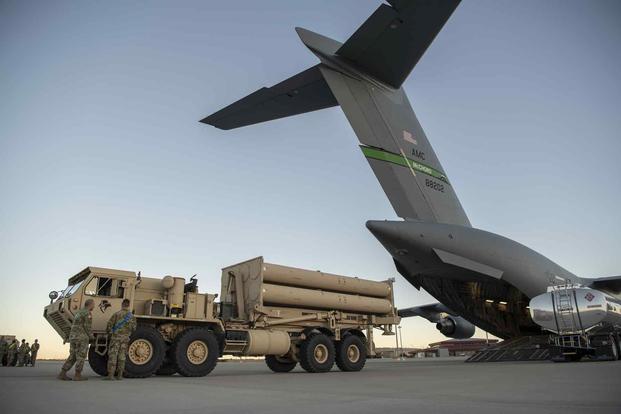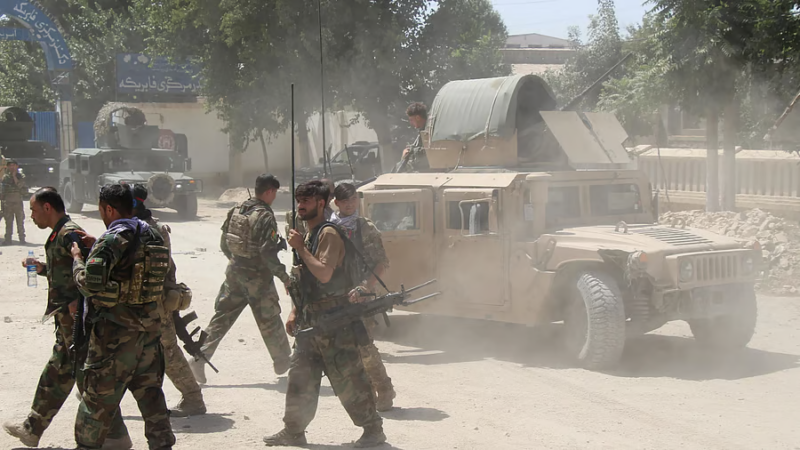Following thirteen drone attacks, Army Air Defense Units from three bases are deploying to the Middle East.

The Army air defense units deploying to the Middle East amid the Israel-Hamas war come from Fort Bliss in Texas, Fort Liberty in North Carolina, and Fort Sill in Oklahoma, the Pentagon said Tuesday.
The units are bringing Patriot missile batteries and a Terminal High Altitude Area Defense, or THAAD, battery to the region after more than a dozen drone and rocket attacks on U.S. bases in Iraq and Syria over the past week that the Pentagon has blamed on Iranian proxies. NBC News reported Tuesday evening that two dozen American military personnel were wounded in the attacks, but that could not be immediately confirmed by Military.com.
Although Pentagon officials didn’t name the Army units being deployed, Fort Bliss is home to the 11th Air Defense Artillery Brigade, Fort Liberty hosts the 108th Air Defense Artillery Brigade, and Fort Sill is home to the 31st Air Defense Artillery Brigade.
The units are among the latest deployments to the Middle East following two aircraft carrier strike groups earlier this month; F-16 Fighting Falcon fighter jets this week — adding to jets and A-10 Thunderbolt II planes already sent; and military advisers including a Marine Corps general versed in urban warfare to aid Israel as it wages war on Hamas.
Brig. Gen. Pat Ryder, the top Pentagon spokesman who briefed reporters Tuesday, would not say how many troops are deploying with the air defense units or give their specific destinations. He did say that a THAAD battery was coming from Fort Bliss and the Patriot battalions would come from Fort Liberty and Fort Bliss.
More than 2,000 U.S. troops were also put on ready-to-deploy orders by Defense Secretary Lloyd Austin as yet another show of support for Israel, which declared war against Hamas, which rules the Gaza Strip, after its sudden and brazen terrorist attack on Oct. 7 killed about 1,400 Israelis.
The deployment of the air defenses came as Pentagon officials disclosed new details about an uptick in drone and missile strikes on U.S. bases in the region since last week. On Monday, the Pentagon blamed the attacks on Iran and groups it supports in the region, and said it expected the threat to grow as the bloody war in Israel and Gaza drags on.
Ryder said that between Oct. 17 and Oct. 24, “U.S. and coalition forces have been attacked at least 10 separate times in Iraq and three separate times in Syria via a mix of one-way attack drones and rockets.”
The Pentagon had revealed some of these attacks last week as they occurred, but Ryder stressed that 13 attacks are “initial numbers.”
Defense officials have also stepped up the rhetoric around the attacks, telling reporters Monday that they “see a prospect for much more significant escalation against U.S. forces and personnel in the near term and, let’s be clear about it, the road leads back to Iran.”
Marine Corps Commandant Gen. Eric Smith was even more direct. Defense officials said last week that the Marine Corps’ 26th Expeditionary Unit was heading “to the waters off of Israel” as a result of the crisis after it abruptly ended pre-scheduled training in Kuwait.
A Navy spokesperson told Military.com on Monday that the Bataan Amphibious Ready Group, which transports the 26th MEU, was in the Gulf of Oman area conducting freedom of navigation operations.
The Marines now deployed to the area “bring with them the weapons of war, if needed,” Smith told a crowd Monday while speaking at a memorial for the 40th anniversary of the bombing of the Marine barracks in Beirut.
“For those that are in the area, if that MEU has to go in, if you target them, someone else will raise your children,” Smith added.
Meanwhile, at sea, the destroyer USS Carney shot down drones and Houthi-launched cruise missiles on Thursday. The incident has been framed as a self-defense move by the Pentagon since last week, when officials wouldn’t say whether the threat they posed was to the ship or Israel.
Ryder told reporters Tuesday that the land attack cruise missiles that the Carney shot down had a range that “was likely in excess of 2,000 kilometers,” making them quite capable of striking Israel.
Another addition to the Middle East besides the Army’s air defense missiles will be more F-16 Fighting Falcon fighter jets from the New Jersey Air National Guard‘s 119th Expeditionary Fighter Squadron. Ryder said that the unit arrived in the Middle East on Tuesday.






